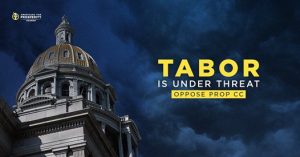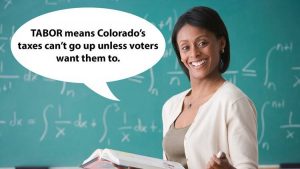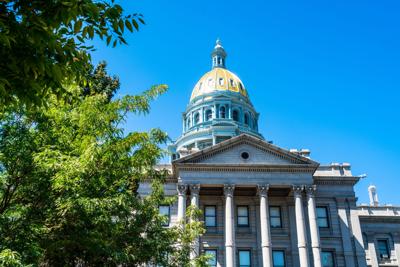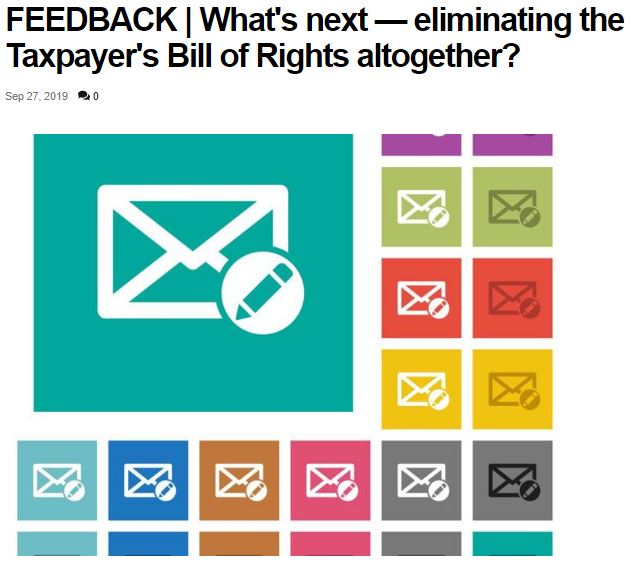
The Problem Is Not That People Are Taxed Too Little, The Problem Is That Government Spends Too Much


Some people bemoan the lack of trust in government officials. Those people should read more. They could start by learning how many of Colorado’s officials ruthlessly manipulate ballot language to mislead voters and skew election results.
Jefferson County’s Ballot Issue 1A—up for a vote next month—is a case in point.
Issue 1A is a referendum under the Colorado Taxpayer’s Bill of Rights (TABOR). TABOR requires officials to ask voter permission, via referendum, for several kinds of fiscal decisions. The most important are (1) raising taxes, (2) creating debt, and (3) waiving caps on government spending (which TABOR sometimes confusingly calls “revenue”).
Knowing that government officials sometimes try to manipulate elections, the TABOR drafters inserted rules governing how tax and debt issues appear on the ballot. But they omitted similar rules for elections to waive spending caps.
The reasons for the omission are not clear. Perhaps it was an oversight. Or perhaps the drafters thought rules were unnecessary, because waivers were to last a maximum of four years. If a waiver was abused, the abuse would soon be over and voters could hold the guilty officials accountable.
But in 2002, the Colorado Court of Appeals issued a case seriously misinterpreting TABOR. The court ruled that once the voters in a particular locale approve a spending cap waiver, the waiver does not necessarily expire. The waiver may specify five years, or seven, or ten. If it does not contain an ending date, the waiver lasts forever. TABOR spending caps never apply in that locale again.
October 7, 2019

There is much to like in the Taxpayer’s Bill of Rights (TABOR), and it’s good to remember that it includes good government provisions that improve election procedures.
None of us want to put up with elected officials holding a surprise election for voter approval of a government’s action. Yet, there were times in the past in which the public was not adequately informed about an election. The elected officials would list it in a newspaper’s Public Notices section, and of course had to put the ballot measure into the government’s official record. But that was insufficient to let voters know what was going on, and by doing the minimum possible to notify voters, some governments were able to keep the elections low profile. The intent of suppressing turnout was so that only those people heavily invested in passage would participate. The normal citizen, the rank-and-file taxpayer, might miss a special election, allowing others to vote in, say, a new debt issue or increase a tax rate.
The Taxpayer’s Bill of Rights corrected that situation. The constitutional measure pertains to all governments in Colorado, even small special districts that don’t command much attention.

When bringing an issue before the voters, TABOR requires that “At least 30 days before a ballot issue election, districts shall mail …. a titled notice ….. addressed to ‘All Registered Voters’ at each address of one or more active registered electors. …. Titles shall have this order of preference ‘NOTICE OF ELECTION TO INCREASE TAXES (or) TO INCREASE DEBT….’
The paragraph contains even more specifics, as it was carefully crafted to prevent elected officers from circumventing it. This important constitutional provision improves the operations of all governments in our state and protects the taxpayer in ways beyond just voting on tax rates.

The Colorado state Capitol in Denver.
Do not give politicians a blank check. They have proven unable to manage what they already have.
Colorado is not a low-tax state where politicians scrape to fund basic services. Our state did not make Kiplinger’s top-10 list of the most tax-friendly states this year, released last week, despite having a one-of-a-kind Taxpayer’s Bill of Rights in the state constitution. Weakening this protection, as Proposition CC would do, will only make things worse.
Oct 5, 2019
Last year, Colorado voters overwhelmingly rejected last year’s ballot measure that amounted to a multibillion-dollar tax increase on families and businesses. But taxpayers beware: pro-tax activists are back on the ballot again this November with a measure to weaken Colorado’s historic Taxpayer Bill of Rights, so that they can more easily pass tax increases in the future.
This year’s ballot measure is Proposition CC, which would alter TABOR in a way that would take money out of taxpayers’ pockets. Since it was approved by voters in 1992, TABOR has provided Coloradans with the strongest set of taxpayer protections in the country. By guaranteeing refunds of excessive taxes, restricting spending to sensible growth rates, and giving Coloradans the ability to vote on tax increases, TABOR has been instrumental in the state’s booming economy. Without TABOR, Colorado would likely not be one of the fastest growing states in the country, even as the state continues to rank high on measurements of public health and education.
Since TABOR limits the amount of money the state is allowed to spend, surplus revenue in excess of the cap must be refunded to Colorado taxpayers. Generally, the revenue cap on the state level grows with inflation plus population increases. Due to a strong economy, however, revenue collections are coming in above the caps, which means the state will have to refund about $500 million to Colorado taxpayers next year, and about $1.3 billion over the next three years. For millions of taxpayers across the state, these refunds could help cover a week’s worth of groceries, family activities, or even help to pay some rent.
But as of now, potentially $1.3 billion in refunds to taxpayers are in limbo and could be scrapped forever.
To read the rest of this story, please click (HERE):
“On Sunday, the Denver Post endorsed a “NO” vote on Proposition CC on the ballot this fall. Although the Post editorial board has not changed its historic support for ever more and higher taxes, even they could not overlook how terribly flawed and poorly thought-out this measure is.”
Click (HERE) to read the Denver Post Editorial:

November 2019 Ballot Measure Will Decide Fate Of All Future Taxpayer Refunds In Colorado
The ultimate debate over the refunding of surplus revenue to taxpayers is taking place in Colorado, home to the Taxpayer’s Bill of Rights (TABOR), a law that requires surplus revenue collected in excess of the rate of population growth plus inflation be returned to Colorado taxpayers.
Thanks to a strong economy, revenue collections have been coming in well-above the TABOR spending cap, meaning that roughly $650 million is scheduled to be refunded to Colorado taxpayers. Proposition CC, a measure referred to the November 2019 ballot by Governor Jared Polis (D) and Democrats who run the Colorado Legislature, would stop that scheduled refund, and all future refunds.
Passage of Proposition CC would gut TABOR, guaranteeing a higher state tax burden in the future, even if all tax increases would still be subject to voter approval.
“Prop CC says you agree to give up your tax refunds not for just this year, not for the next four years, but forever,” Jon Caldara, president of the Independence Institute, writes in the Denver Post this week. “No future generation will be able to give or withhold their consent over their tax refunds…Our children’s children’s children will never get a TABOR refund. Nor even be asked.”

The rising costs of Gov. Jared Polis’ full-day kindergarten program is part of an estimated $100 million in additional costs lawmakers will need to cover
“In November 2018, the TABOR Foundation joined the Colorado Union of Taxpayers and others in filing a “friend-of-the-court” brief. The lawsuit was brought by the National Federation of Independent Business against the Colorado Secretary of State. The issue was about whether the fees charged by that government department are excessive and used to cover government activities that should be funded by general fund taxes.
Jim Manley, the attorney who represented the TABOR Foundation et al, commented on the substance and importance of our brief: “(On September 23) the Colorado Supreme Court issued a narrow ruling against NFIB in its TABOR challenge to the Secretary of State’s business licensing “fees.” The Court’s narrow ruling sidestepped the two issues we addressed in our amicus brief: (1) the proper standard of review for constitutional challenges and (2) the definition of fees vs. taxes. The Court ruled that the business licensing fees were authorized before TABOR’s enactment and—despite changes to the fees since TABOR—the fees were therefore not subject to TABOR’s prospective limits. The ruling reinstates the trial court’s summary judgment in favor of the Secretary of State and likely ends the case.”
The TABOR Foundation chairman observed, “This narrow ruling does little mischief to the Taxpayer’s Bill of Rights,” said Penn Pfiffner. He continued, “The Court could have, and should have, used the opportunity to honor the TABOR mandate to rule such that the outcome ‘reasonably restrain(s) most the growth of government’.”
To read the Summary Judgement opinion, click (HERE):
To read the Amicus from the Colorado Supreme Court website, please click (HERE):